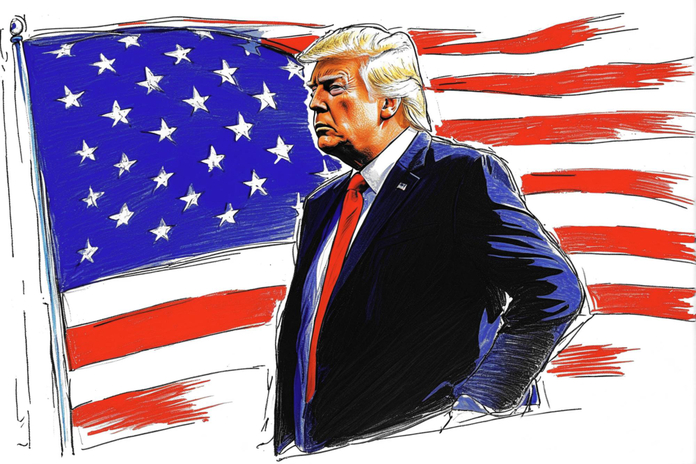The ongoing uncertainty surrounding President Donald Trump’s trade war has taken a toll on U.S. stocks, pushing the market lower as companies announce adjustments to their forecasts due to the fallout from tariffs. While AI stocks have dominated headlines recently, even these high-flying companies are feeling the effects of the economic instability caused by trade tensions.
Stock Market Struggles Amid Tariff Uncertainty
As of Tuesday afternoon, U.S. stocks were in the red, with the S&P 500 down 0.5%, continuing its downward slide after a brief rally. The Dow Jones Industrial Average dropped by 198 points, or 0.5%, while the Nasdaq Composite lost 0.6%. The market’s decline comes as more companies are revising their expectations for the year due to the impact of tariffs on their business models.
AI Stocks Hit Hard by Tariff Concerns
Despite the previous surge in AI-related stocks, such as Palantir Technologies (NYSE: PLTR) and Nvidia (NASDAQ: NVDA), these companies have struggled to maintain investor confidence. Palantir, which provides AI platforms, saw its stock drop by 14%, even though the company met analysts’ expectations for profit and raised its revenue forecast. The company’s stock price remains near $110, down from around $130 earlier this year. Nvidia, another key player in the AI space, also saw a dip of 0.7%, reflecting the growing concerns about the broader economic picture.
Clorox and Mattel Adjust Forecasts Due to Trade War
The effects of Trump’s tariffs are extending beyond the tech sector. Clorox (NYSE: CLX), for instance, reported weaker-than-expected revenue and profit for the latest quarter. CEO Linda Rendle mentioned that changes in consumer behavior, in part due to tariffs, led to lower sales. Clorox’s stock fell 2.2% following the announcement, and the company warned that the slowdown would likely continue.
Similarly, toymaker Mattel (NASDAQ: MAT) has paused its financial forecasts for 2025, citing the unpredictable nature of the U.S. tariff landscape. This uncertainty makes it difficult to gauge consumer spending over the holiday season and beyond. Despite the uncertainty, Mattel’s stock showed some resilience, rising by 4% after reporting better-than-expected results for the quarter.
Ford Faces $1.5 Billion Hit from Tariffs
Automaker Ford Motor (NYSE: F) has also warned that it expects a $1.5 billion hit this year due to the tariffs imposed by the Trump administration. Ford, like many other companies, has pulled its financial forecasts for the year, citing tariff-related uncertainty as a major obstacle. The company’s cautious outlook underscores the growing concern among businesses about the long-term effects of Trump’s trade policies.
DoorDash Sees Slower Growth Amid Uncertainty
The uncertainty surrounding tariffs is not just affecting large corporations. DoorDash (NYSE: DASH), a food delivery service, reported weaker-than-expected revenue for the latest quarter, with its stock dropping 7.5%. However, the company also noted that its order growth remained steady, suggesting that consumer behavior may not be as severely impacted as some analysts feared.
The Federal Reserve’s Role in Tariff-Driven Economy
Amid these developments, the U.S. Federal Reserve is holding a two-day meeting, with market participants awaiting its decision on interest rates. While many expect no immediate change, concerns remain that Trump’s tariffs could lead to higher inflation, complicating the Fed’s decision-making process.
Trump Tariffs and Inflation Concerns
The impact of tariffs is multifaceted. On one hand, tariffs are increasing costs for companies that rely on imported goods, leading to higher prices for consumers. On the other hand, the uncertainty around future tariffs has caused businesses to become more cautious in their planning and forecasting. With the specter of inflation hanging over the economy, many analysts are predicting that the U.S. could face further economic challenges if the trade war continues.
Global Market Reactions to U.S. Economic Concerns
The effects of Trump’s tariffs are also being felt beyond the U.S. stock market. European and Asian markets showed mixed results, with Shanghai’s index rising by 1.1% and Hong Kong gaining 0.7%. However, global investors are clearly worried about the broader implications of the ongoing trade conflict.
As U.S. companies continue to adjust their forecasts in response to the Trump tariffs impact, it remains to be seen whether the trade war will push the economy into a full-blown recession or if the uncertainty will begin to ease. Until then, the stock market will likely remain volatile, with tariffs at the forefront of investors’ concerns.
Featured Image: Freepik








